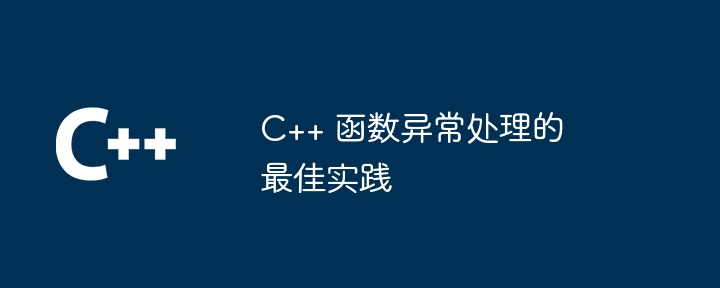
Exception handling is an error handling mechanism in C, implemented through try-catch blocks. When throwing exceptions, use the throw keyword and throw domain-specific exceptions. Best practices include: 1. Use exceptions only when necessary; 2. Throw domain-specific exceptions; 3. Provide meaningful error messages; 4. Use noexcept to specify functions that do not throw exceptions; 5. Use smart pointers Or RAII technology to avoid memory leaks.

C Function Exception Handling: Best Practices
Exception handling is a mechanism in C to catch and handle runtime errors . It makes your program more robust by throwing and catching exceptions to easily handle errors.
try-catch blocks
In C, exception handling is implemented through try-catch blocks. The try block contains code that may throw an exception, and the catch block contains code for catching and handling exceptions.
try {
// 可能引发异常的代码
} catch (const std::exception& e) {
// 捕获和处理异常
}Throw exception
To throw an exception, you can use the throw keyword. Any type of value can be thrown, but exception classes are usually used. For example:
throw std::runtime_error("错误信息");Practical case: Open a file
Consider a function that opens a file. If the file does not exist, it should throw an exception.
class FileOpenError : public std::exception {
// 文件打开错误异常类
};
bool openFile(const std::string& filename) {
std::ifstream file(filename);
if (!file.is_open()) {
throw FileOpenError();
}
// 其余的文件操作代码
return true;
}When using the openFile function, you can catch the FileOpenError exception in the try-catch block:
try {
openFile("不存在的文件");
} catch (const FileOpenError& e) {
std::cout << "文件无法打开。" << std::endl;
}Best Practices
The following are some best practices for function exception handling:
The above is the detailed content of Best practices for C++ function exception handling. For more information, please follow other related articles on the PHP Chinese website!
 What are the differences between c++ and c language
What are the differences between c++ and c language
 Recommended learning order for c++ and python
Recommended learning order for c++ and python
 Cost-effectiveness analysis of learning python and c++
Cost-effectiveness analysis of learning python and c++
 Is c language the same as c++?
Is c language the same as c++?
 Which is better to learn first, c language or c++?
Which is better to learn first, c language or c++?
 The difference and connection between c language and c++
The difference and connection between c language and c++
 C++ software Chinese change tutorial
C++ software Chinese change tutorial
 Cost-effectiveness analysis of learning python, java and c++
Cost-effectiveness analysis of learning python, java and c++




